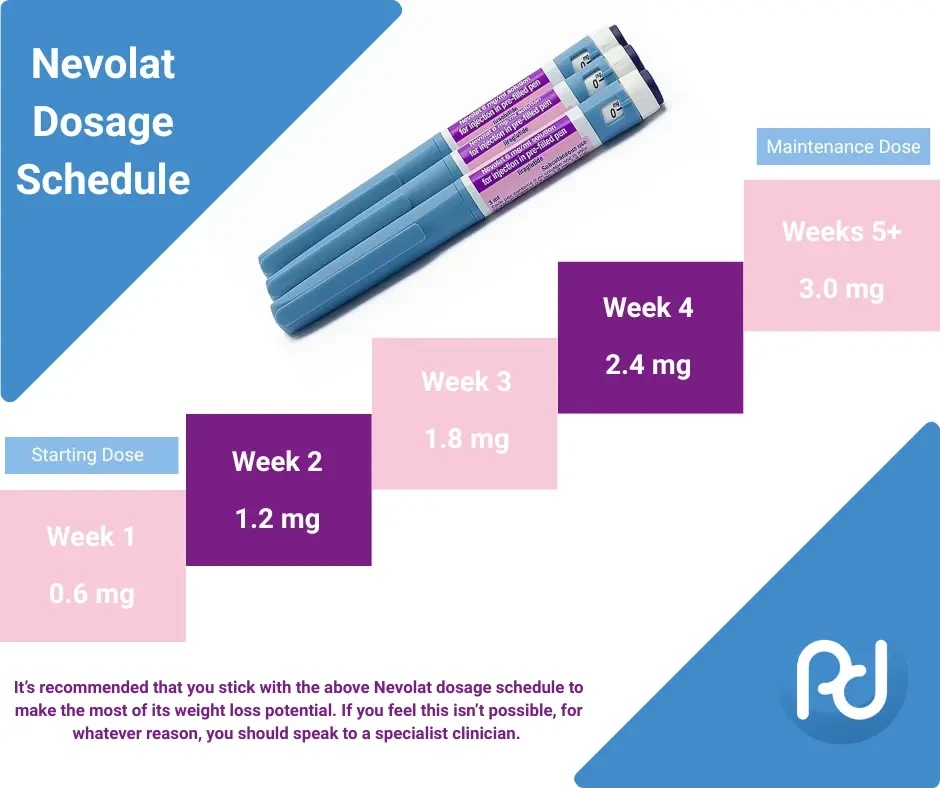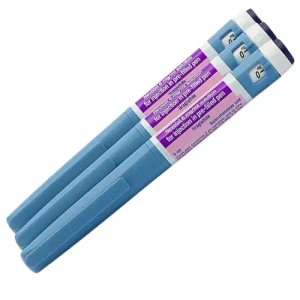Nevolat vs Saxenda: What’s the Difference?
Table of contents:
- Are Saxenda and Nevolat the Same Thing?
- What is the Difference Between Nevolat and Saxenda?
- Nevolat vs Saxenda: Which is Most Effective for Weight Loss?
- Nevolat and Saxenda Dosing Schedule
- Saxenda vs Nevolat Side Effects
- Alternatives to Nevolat and Saxenda
- Begin Your Nevolat Weight Loss Journey With Prescription Doctor
Saxenda and Nevolat are two of several weight loss injections currently available in the UK. These medicines are highly effective treatments for obesity, and if you’re trying to lose weight, you may already know a bit about them. However, a thorough understanding of these drugs is key to choosing the best option for your weight loss journey.
If you’re weighing the benefits of Nevolat vs. Saxenda, learning how they differ is central to making an informed decision. Here, you’ll discover what Saxenda and Nevolat are, how effective they are for weight loss, and their potential side effects.
START YOUR NEVOLAT CONSULTATION TODAY
Are Saxenda and Nevolat the Same Thing?
While Nevolat and Saxenda are very similar, they are not the same product. Both contain the same active ingredient, liraglutide and are injectable drugs administered subcutaneously on the same dosing schedule. They are licensed on prescription in the UK and available to anyone meeting the criteria for weight loss injections.
Liraglutide belongs to a class of drugs called GLP-1 agonists, which are found in several popular weight loss injections. These treatments mimic the effects of GLP-1, a hormone released from the small intestine in response to food intake. GLP-1 has several digestive functions, including slowing the rate at which food travels from the stomach to the small intestine. This makes you feel full quicker, reducing your appetite and, therefore, calorie intake.
The effect of liraglutide on the body can lead to significant weight loss, with participants in clinical studies shedding up to 15% of their total body weight over a 56-week treatment period.
What is the Difference Between Nevolat and Saxenda?
Nevolat and Saxenda are manufactured by different companies. Zentiva Pharma produces Nevolat, and Novo Nordisk produced Saxenda, until deciding to focus its efforts on making Wegovy.
Though they share the same active ingredient (liraglutide), Nevolat and Saxenda have slightly different formulations. Their inactive ingredient lists are almost identical, with only two variations; Saxenda contains disodium phosphate dihydrate, whereas Nevolat contains sodium citrate dihydrate. However, as the inactive ingredients don’t affect how the products work, these differences have no impact on their effectiveness for weight loss.
As the generic version of Saxenda, Nevolat is available at a lower price, making it the most cost-effective treatment of the two.
Nevolat vs Saxenda: Which is Most Effective for Weight Loss?
As Nevolat and Saxenda both contain liraglutide as their active ingredient, there is no difference in their effectiveness for weight loss. Research has consistently demonstrated the benefits of liraglutide as a weight loss aid. One meta-analysis found that liraglutide treatment combined with physical activity and a calorie deficit produced greater weight loss results than diet and exercise alone.
People often lose a substantial amount of weight while taking liraglutide. Over half of the participants in one study lost 5% of their body weight on liraglutide, and 11.3% reduced their weight by at least 15%. Although liraglutide is undoubtedly an effective aid for weight loss, it is most effective when combined with a healthy diet and regular physical activity. Many people lose a substantial amount of weight when starting liraglutide, but often regain it if they don’t stick to a holistic weight management plan.
Liraglutide also has a myriad of other health benefits, including improvements in blood sugar control, blood pressure, cholesterol levels, and sleep apnoea.
Nevolat
Nevolat and Saxenda Dosing Schedule
As Nevolat and Saxenda both contain liraglutide, they have the same dosing schedule. Liraglutide is administered as a daily injection, with a starting dose of 0.6 mg. You can increase the dosage each week until you reach the maintenance dose of 3.0 mg, which you can continue for the duration of your treatment.
Slowly increasing the dose in 1-week increments is thought to reduce your risk of side effects. Individuals who experience gastrointestinal symptoms during dose escalation may benefit from delaying the dosage increase by one week. If you have questions about your Nevolat dosing schedule, always consult a licensed clinician before making any changes.

Saxenda vs Nevolat Side Effects
Saxenda and Nevolat produce the same set of side effects, most of which affect the digestive system. The most common side effects of liraglutide, affecting at least 5% of users, include:
- Nausea
- Vomiting
- Diarrhoea
- Constipation
- Headache
- Indigestion
- Fatigue
- Dizziness
- Abdominal pain
- Fever
- Injection site reactions (e.g., rash and itching)
Hypoglycemia (low blood sugar) is also a common side effect of liraglutide. However, it is most likely to affect people using the injections in combination with other antidiabetic medications, like insulin or sulfonylureas.
In rarer cases, liraglutide can cause serious side effects that require urgent medical attention. These include:
- Acute pancreatitis
- Problems with kidney function
- Acute gallbladder disease
- Severe allergic reaction (anaphylaxis)
Nevolat
Fortunately, many of the common side effects of Saxenda and Nevolat can be reduced with simple dietary modifications. The general advice for reducing gastrointestinal symptoms is as follows:
- Eat smaller portions
- Eat slowly and only when very hungry
- Stop eating when full
- Avoid physical activity after eating
- Don’t eat close to bedtime
- Avoid fatty and spicy foods
- Eat foods with a high water content (e.g., soup)
- Stay hydrated
You may be able to relieve liraglutide-related stomach problems by following the above advice. However, severe and persistent side effects may indicate a more serious health issue, and you should always report these to a healthcare professional.
Alternatives to Nevolat and Saxenda
Nevolat and Saxenda are two of several licensed weight loss injections in the UK. Other popular options include semaglutide (found in Wegovy) and tirzepatide (in Mounjaro).
Like liraglutide, semaglutide is a GLP-1 agonist and simulates the GLP-1 hormone. Tirzepatide, however, is a little different. It mimics the actions of two gut hormones (GIP and GLP-1), an effect that researchers think enhances the effectiveness of tirzepatide as a weight loss tool.
Injectable drugs aren’t the only option for weight loss medication in the UK; you could also look into weight loss pills. Xenical contains orlistat and works by blocking the absorption of dietary fats. There’s also Mysimba (naltrexone and bupropion), which can reduce your appetite and make it easier to maintain a calorie deficit.
Begin Your Nevolat Weight Loss Journey With Prescription Doctor
Now that you understand the similarities and differences between Nevolat vs Saxenda, it’s time to embark on your weight loss journey. Having helped people achieve their goals since 2013, Prescription Doctor is on hand to do the same for you.
Complete our online medical questionnaire, and our specialist clinicians will assess your situation and determine whether Nevolat is right for you. If not, they may recommend an alternative solution for your requirements.
As part of our weight loss consultation service, our team can guide you throughout your journey. Whether it’s providing essential diet tips or regularly checking in on progress, you can rely on us to support you every step of the way.
We also partner with a UK-regulated, General Pharmaceutical Council-approved dispensing pharmacy, so you can be completely confident in the quality of our products and service. We are here for you.
Ready to take the first step in your journey? Start your consultation today.
Sources
- NIH (2024): Glucagon-Like Peptide-1 Receptor Agonists.
- Wiley (2023): Clinical effectiveness of Liraglutide 3.0 mg and impact of weight loss in improving obesity-related comorbid conditions in King Fahad Medical City, Kingdom of Saudi Arabia: A real-world experience.
- EMC (2025): Nevolat 6 mg/ml solution for injection in pre-filled pen.
- FDA: Saxenda Prescribing Information.
- PubMed (2015): The GLP-1 agonist, liraglutide, as a pharmacotherapy for obesity.
- NEJM (2021): Healthy Weight Loss Maintenance with Exercise, Liraglutide, or Both Combined.
- NIH (2024): Liraglutide.
- PubMed (2020): Impact of dose‐escalation schemes and drug discontinuation on weight loss outcomes with liraglutide 3.0 mg: A model‐based approach.
- PubMed (2022): Clinical Recommendations to Manage Gastrointestinal Adverse Events in Patients Treated with GLP-1 Receptor Agonists: A Multidisciplinary Expert Consensus.
- UK Government (2025): GLP-1 medicines for weight loss and diabetes: what you need to know.
- JAMA (2024): Semaglutide vs Tirzepatide for Weight Loss in Adults With Overweight or Obesity.
- PubMed (2020): Oral Semaglutide.
Authored By

Kate Latham
Medical Content WriterPublished on: 11/07/2025
Reviewed By

Mohamed Imran Lakhi
MPharm - Lead PharmacistReviewed on: 11/07/2025
© 2013 - 2026 Al Muhsineen Limited. All Rights Reserved. Registered Pharmacy: 34 Halliwell Road, Bolton BL1 8RL. Registered Office: 254 First Floor, Shearbrow, Blackburn, England, BB1 8DS







